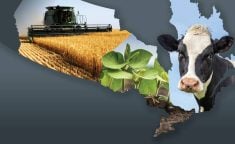Agriculture is in the hands of a new minister after a provincial cabinet shuffle Oct. 23.
Blaine Pedersen will head up the newly expanded Department of Agriculture and Resource Development, the province said, taking over from previous agriculture minister Ralph Eichler.
Eichler, meanwhile, has been appointed minister of economic development and training. The new department has a mandate to, “create synergies and alignment between learning and the jobs that will drive the economy,” a release for the province said.
Read Also

Mazergroup’s Bob Mazer dies
Mazergroup’s Bob Mazer, who helped grow his family’s company into a string of farm equipment dealerships and the main dealer for New Holland machinery in Saskatchewan and Manitoba, died July 6 from cancer.
Why it matters: The provincial cabinet will look much different for Brian Pallister’s second term, including a new agriculture minister and an expanded Agriculture Department that now includes water management, mining and forestry.
Premier Brian Pallister pointed to synergies between Eichler’s term as agriculture minister and the growing agribusiness in Manitoba.
“We’re leading the country in attracting capital,” he said. “Seventy-two per cent of that over the last two years has been in value-added agriculture, so the economic development portfolio that Ralph’s going into, in a sense, is what we’ve been focusing on in agriculture.”
The province needs to amalgamate those agribusiness gains with other sectors for more streamlined economic development, he said.
The change came a month and a half after Pallister won a second majority government and is one of several cabinet change-ups announced. Pallister added two ministers, bringing his cabinet up to 15. Brandon West MLA Reg Helwer was named minister of central services, focused on government service efficiency, while Fort Richmond MLA Sarah Guillemard took over the newly formed Department of Conservation and Climate.
Seven of Manitoba’s 15 cabinet ministers have new or changed mandates after the shuffle. As well as Helwer, Guillemard, Eichler and Pedersen, Riel MLA Rochelle Squires has moved from the now-defunct Manitoba Sustainable Development to minister of municipal relations, Minister Cathy Cox will add the status of women to her portfolio of sport, culture and heritage, and Jeff Wharton will continue to act as Crown services minister, a role he took on in addition to minister of municipal relations after the September election.
New departments
The announcement divides Manitoba Sustainable Development between the Department of Conservation and Climate and the expanded Agriculture Department, now the Department of Agriculture and Resource Development.
Pedersen’s new department adds forestry, mining, watershed management, GROW programming (the province’s watershed protection and management program) and fish and wildlife management to the agriculture portfolio.
The Department of Conservation and Climate, meanwhile, will be, “responsible for ensuring responsible growth including delivery of the made-in-Manitoba Climate and Green Plan, and Efficiency Manitoba,” a provincial release said.
The department will be able to, “more effectively work with people in the resource development sector to solve problems in advance rather than have them have to go from the ag office and then have to deal with another three government departments,” Pallister said, pointing to the frequent interplay between infrastructure, conservation and agriculture departments.
The division also led to conflict between departments, he added. He used the example of a planned building expansion running afoul of conservation rules.
Pedersen echoed the sentiment.
“We feel this is a good fit,” he said. “Agriculture is a natural resource, and so taking on the mining, petroleum, forestry, fish and wildlife with it, they’re all natural resources.”
The watershed districts and GROW conservation trust also dovetail with agriculture, he said, since so much of that work involves farmland.
“From the regulatory side, too often the agriculture community was having to deal with two or more different departments and now it becomes a one-stop shop for the ag community,” he said.
Pallister also dismissed concerns that the expanded portfolio might make the department too large or take focus away from agriculture.
“In terms of pure numbers, (agriculture) is not one of the biggest departments,” he said. “I would say, though, that it is an important department and I would say, quite confidently without patting myself on the back too much, I’m a pretty good judge of the competence and capabilities of my team and I think I put the right people in charge of the right departments.”
KAP responds
Bill Campbell, Keystone Agricultural Producers president, was generally optimistic about the restructured department, as long as there are enough resources.
“When we come to the table to talk we can address agricultural needs at the same time as some of the other natural resources issues the minister will be handling,” Campbell said. “I think GROW (Growing Outcomes in Watersheds) is one of them. That would be a benefit for sure.”
The province announced its first three projects under the $52-million GROW fund Oct. 22. Both the Seine-Rat River Conservation District and the Little Saskatchewan River Conservation District added $250,000 to their budget for watershed protection, while the TransCanada Shelterbelt Renewal Project will receive $1 million.
Pedersen’s own history as a farmer will likely help when industry and the province meet at the table, Campbell also said.
Pedersen steps into tough ag year
Agriculture and Resource Development Minister Blaine Pedersen is inheriting a challenging farm year along with the ag portfolio.
Much of the province struggled with drought conditions through the growing season, leading to a forecasted critical shortage of feed and 16 municipalities in the Interlake and Parkland declaring a state of agricultural disaster. Forage harvest came in well below average for a second year, while pasture conditions led to early feeding in August. Grain producers, meanwhile, are still fighting a tough harvest after weather turned wet in September. About 25 per cent of the province’s crop was still in the field in mid-October when a historic snowstorm dropped up to 74 centimetres of snow over three days. Harvest was further delayed two weeks or more as snow melted and producers began to hope for a freeze to allow them back in the field.
As of Oct. 22, only 41 per cent of the province’s soybeans, 63 per cent of Manitoba’s potatoes and half of the province’s corn silage were off the field. Numbers were even lower in the east and southwest, where only 20 per cent of soybeans were harvested. The southwest also reported that only 55 per cent of canola was in the bin.
“It’s an ongoing thing that we’re going to continue to look at,” Pedersen said, noting his department’s weekly harvest updates. “Harvest progress has certainly been slow in the last number of weeks. Everybody’s hoping for some good weather.”
Pedersen will also face the ongoing controversy over Agricultural Crown Lands. The province drew criticism this month after releasing new lease regulations in late September. The regulations drew ire from forage leaseholders, who balked at higher rents and argued that shortened lease terms and the auction system put the long-term future of their ranches in question. Those ranchers are currently pushing for a renewal mechanism for all leases — not just legacy leases grandfathered in — and unit transfers, which they argue will help preserve farm value.
Pedersen says both the Manitoba Beef Producers and Keystone Agricultural Producers were “quick to remind him,” of those issues during recent phone calls. Pedersen says he is still new to his position, but will be reaching out to farmers through their farm organizations and will be looking at farmer concerns.




















